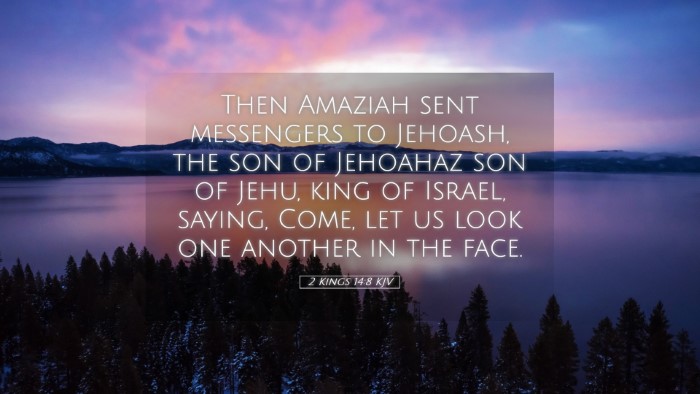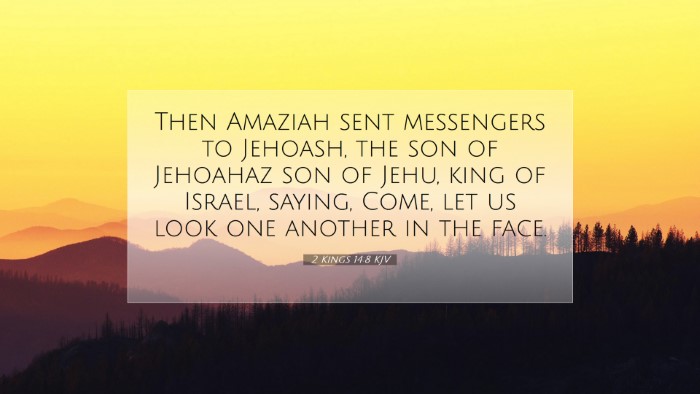Commentary on 2 Kings 14:8
2 Kings 14:8: “Then Amaziah sent messengers to Jehoash the son of Jehoahaz, the son of Jehu, king of Israel, saying, 'Come, let us face one another in battle.'
Introduction
The verse presents a pivotal moment in the reign of Amaziah, king of Judah, as he seeks to confront Jehoash, king of Israel. This passage raises significant points for consideration within the broader narrative of the kings of Israel and Judah.
Contextual Background
Amaziah reigned in Judah following the tumultuous period marked by the reigns of his predecessors. His initiation of conflict with Israel can be viewed as both a moment of pride and an account of divine providence in the narrative of Israel’s history.
Amaziah's Character and Actions
Amaziah's character can be discerned from the historical context and scriptural references. Barnabas highlights in his commentary the duality of his reign—marked by both faithfulness and folly.
- Military Aspirations: Amaziah's declaration to face Jehoash indicates a desire to assert his power and secure his kingdom's standing among the neighboring nations.
- Spiritual Instability: His prior engagement with idolatry (2 Kings 14:4) taints his initiative, suggesting a reliance on military might rather than divine approval.
A Public Challenge
By sending messengers to Jehoash, Amaziah proclaims an aggressive posture that illustrates his ambition. Matthew Henry notes that this was not just a personal challenge, but one that could lead to significant national ramifications.
Theological Implications
This confrontation has profound theological ramifications regarding human pride versus divine sovereignty. The challenge posed by Amaziah can be analyzed through several lenses:
- Human Pride: Amaziah's decision can be viewed as an embodiment of hubris. His previous victory over Edom may have inflated his ego.
- Divine Sovereignty: The response from Jehoash speaks to God's control over the affairs of nations. It underscores that God remains sovereign, regardless of human endeavors.
- Repercussions of War: The impending confrontation raises questions about the moral and spiritual costs associated with war. Clark remarks on the futility of such conflicts when not rooted in the divine intent.
Historical Context of Israel and Judah
The relationship between Israel and Judah is fraught with tension, and this particular challenge serves as an exploration of that conflict. The historical animosities illuminate the complexities of leadership and faith in a divided nation.
- Lineage and Legacy: Jehoash, coming from the line of Jehu, had his own legacy of contention, and the dynamics of lineage play a crucial role in the narrative development.
- Political Landscape: A careful examination of the alliances and hostilities prevalent at that time is essential for understanding Amaziah's motivations.
Comparison with Other Texts
This verse can also be illuminated by comparing it to parallel passages. The encounters recorded in the books of Chronicles provide additional insights into Amaziah's character and intentions.
- 2 Chronicles 25: Offers a more detailed recounting of Amaziah’s reign and his military campaigns, emphasizing the interplay of faith and folly.
- Provocation of War: Proverbs 16:18 reminds us that pride precedes destruction—a fitting reflection upon Amaziah's actions.
Lessons for Today
As we reflect on 2 Kings 14:8, there are valuable lessons that emerge for pastors, theologians, and students of the Word:
- The Call to Humility: The narrative warns against pride. Leaders must continually examine their hearts and motives.
- Dependence on God: Genuine reliance on God supersedes the fragility of military power. History reminds us of the importance of spiritual warfare over physical conflict.
- Understanding Divine Timing: The text compels us to consider the timing and providence of God in the affairs of mankind.
Conclusion
This verse serves as a critical juncture in the accounts of Amaziah’s reign and provides a rich field for theological examination. By engaging with the texts of commentaries from historical figures such as Matthew Henry, Albert Barnes, and Adam Clarke, we can discern broader truths about pride, divine sovereignty, and the human condition. The juxtaposition of Amaziah's ambitions against God's overarching narrative provides a salient reminder of our need for divine guidance in leadership and decision-making.


